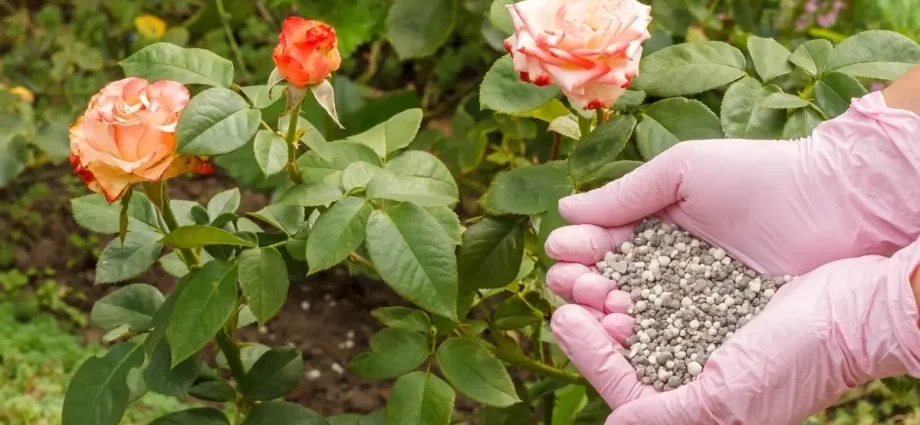Contents
Perhaps there are no other such plants in our gardens that require so much top dressing. No, you can, of course, not fertilize them, but then you should not expect lush flowering from them. And it is likely that you will be left without roses at all, because they need good nutrition not only for growth and development, but also for wintering. Agree, in a harsh climate, this is important.
What fertilizers do roses need
Any plant and roses, including, need 3 main elements.
Nitrogen. It is essential for the growth and development of plants. Thanks to this element, they actively increase the green mass – shoots and leaves. With a lack of nitrogen, the leaves turn pale (1), roses bloom very weakly.
Phosphorus. He is responsible for flowering. And besides, for the growth of roots and the resistance of plants to adverse factors – frost (2) and drought. With a lack of phosphorus, the growth of shoots and leaves is greatly inhibited (1).
Potassium. It is essential for fruiting. This element increases the amount of sugar and vitamins, provides long-term storage of fruits. When potassium is deficient, plants become susceptible to various diseases, including fungal diseases (2).
Fertilizers for roses when planting
Roses love fertile soil, but even if you have black soil, you need to fertilize the planting pit:
- 1 bucket of humus or well-rotted compost;
- 1 half-liter jar of wood ash;
- 2 cups of bone meal;
- 1 glass of superphosphate.
Fertilizers are mixed with the soil, and planting pits are covered with this nutrient mixture.
Fertilizers for flowering roses
“Roses, like all other plants, need phosphorus, potassium and a little nitrogen to bloom, because at the same time as flowering, the bushes continue to grow green mass for re-blooming at the end of summer,” says agronomist-breeder Svetlana Mihailova.
The feeding scheme is as follows:
- as soon as the buds appear – 1 tbsp. a spoonful of potassium nitrate and superphosphate;
- after 2 weeks – 1 tbsp. a spoonful of Kemira Universal (this fertilizer contains phosphorus, potassium and nitrogen in a ratio of 2:2:1 – ideal for feeding roses);
- after a couple of weeks – 1 tbsp. a spoonful of potassium magnesia.
In all cases, fertilizers must be dissolved in 10 liters of water and watered roses at the rate of 3 liters per bush.
Fertilizers for roses in spring
“In the spring, after pruning, roses actively grow new shoots, so they first of all need nitrogen,” reminds agronomist Svetlana Mikhailova. – At the end of April, they need to be fed with urea – 10 g (this is 1 tablespoon) per 10 liters of water. Fertilizer must be stirred until completely dissolved and water the plants at the rate of 3 liters per bush.
The next top dressing will have to be done in early May – with the same urea in the same dose.
In addition, now there are special fertilizers for roses (this is indicated on the packaging), which, in addition to the main elements, also contain trace elements. They are also brought in in the spring and they are valid all summer. They are very convenient to use, but are more expensive than simple fertilizers.
Fertilizers for roses in summer
People say: the rose is the daughter of manure. These plants, indeed, are very fond of organic matter, therefore, in addition to mineral fertilizers, they need constant feeding with mullein.
The first is given in mid-May, and then every 2 weeks until mid-summer – later organic matter is not needed, because it contains mainly nitrogen, and if given in the second half of summer, roses will actively grow shoots that will not have time to ripen at the end of the season . And in winter they freeze.
The mullein is prepared as follows: half a bucket of fresh cow dung is poured into 5 liters of water and insisted for a week – the fertilizer should ferment. It is best to take it to the far corner of the site, because the smell during fermentation is very strong and unpleasant.
Fermented manure must be diluted with water – 100 g per 10 liters and water roses 3 liters per bush.
Fertilizers for roses in autumn
At the end of the season, roses need phosphorus and potassium – they help the shoots ripen and better endure winter frosts.
The first dressing is given in mid-September: 1 tbsp. a spoonful of superphosphate and potassium sulfate in a bucket of water. You need to water 3 liters per plant.
This dressing is applied every 2 weeks until mid-October. That is, there will be three of them in total.
How to fertilize correctly
The main rule: fertilizers, whether they are dry or liquid top dressing, cannot be applied to dry soil – you can burn the roots. Therefore, the soil must first be watered or fertilized after rain.
Liquid fertilizer solutions must be poured strictly into the soil, avoiding contact with the leaves – they can get burned, because high concentrations are used for root dressing.
And it is also important to strictly observe the doses and terms of application. If the dose is less, there will be no sense, the plants will receive less nutrition. If they are exceeded, they will burn.
Popular questions and answers
We talked about feeding roses with agronomist-breeder Svetlana Mikhailova.
Is it possible to feed roses only with organic matter?
Is it possible to feed roses only with mineral fertilizers?
Is it possible not to feed roses at all?
Sources of
- Petrov B.A., Seliverstov N.F. Mineral nutrition of plants. Reference manual for students and gardeners // Ekaterinburg, 1998 – 79 p.
- Mineev V.G. Agrochemistry. Textbook (2nd edition, revised and enlarged) // M.: MGU Publishing House, KolosS Publishing House, 2004 – 720 p.











Pis